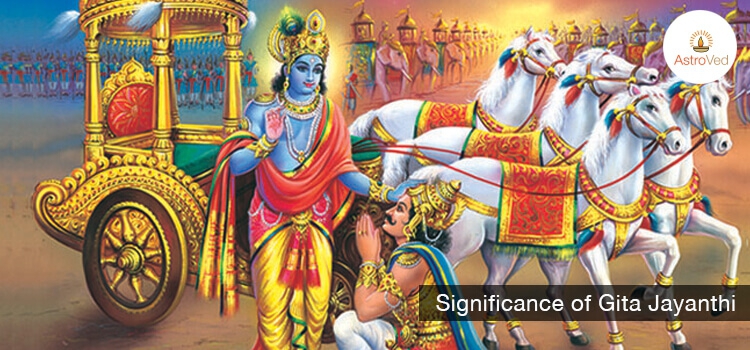Significance of Gita Jayanthi
Gita, an Introduction
Gita is a very well renowned sacred text. Gita refers to Bhagavad Gita, which is regarded as one of the greatest works of divine wisdom ever known to humankind. This scripture is part of the great epic Mahabharatha, which narrates the fascinating story of the princes of Hastinapura. Bhagavad Gita is actually a dialogue between Arjuna, one of the Pandava princes and his dear friend and guide, Krishna.

Gita Jayanthi
Gita Jayanthi is the day when Bhagavad Gita was born. This ‘song divine’ was believed to have been delivered by Lord Krishna on the Ekadasi day during Shukla Paksha, the waxing phase of the Moon in the month of Margashirsha, which corresponds to November-December, in the battle field of Kurukshetra,in the present day Haryana. This momentous occasion that marked the birth of Bhagavad Gita is celebrated as Gita Jayanthi. This day is also known as Moksha Ekadasi, a day regarded as highly auspicious and the one dedicated to the worship of Lord Vishnu. It is believed that the prayers done to the Lord with faith on the Gita Jayanthi–Moksha Ekadasi day can get his immense blessings for the devotees and lead them towards Moksha, the ultimate liberation.
History behind Bhagavad Gita
The Kauravas and their cousins, the Pandavas were the descendants of the Kuru clan. The vicious Kaurava brothers hatched a conspiracy, cheated the virtuous Pandava brothers in a game of dice, usurped their part of the kingdom, humiliated their queen Draupadi in an open court and forced them to spend years in exile in forest. Even after the Pandavas underwent all these ordeals, the Kauravas denied the rights to their cousins. This resulted in things coming to a head and the two sides ended up fighting a bloody war in the soil of Kurukshetra. When the war was about to begin, Arjuna, the Pandava prince and the ace archer dithered, overcome by emotions at the prospect of killing his own elders, teachers and the near and dear ones. It was at that crucial juncture that his friend and charioteer Krishna narrated Bhagavad Gita, with a view of removing Arjuna’s illusions and spurring him to action. Inspired by the message of Gita as propounded by his wise friend, Arjuna and the Pandava army fought a great battle, won it ultimately, thus establishing Dharma, the virtuous way of life, on earth.
The Essence of Gita
Contained in 700 verses, Gita elaborates on a variety of great philosophical thoughts and stresses the supreme importance of Karma, that is, performance of one’s duty. It also explains lucidly about the eternal soul and how it should not be confused with the perishable body in which it resides. It goes on to elucidate the profound concepts of Karma Yoga, Bhakthi Yoga, Gnyana Yoga and Moksha. The truth that Gita expounded was such that it could clear the intense illusion and confusion clouding the mind of Arjuna so thoroughly, that he could fight a great war with clarity of thought and conviction, and win against heavy odds.
Gita Jayanthi Celebrations
Gita Jayanthi is an auspicious day dedicated essentially to the worship of Lord Vishnu. On this day, people take bath early in the morning and do prayers. Many of them observe complete fast on that day. They also install the picture or idol of Lord Krishna or Vishnu at a sacred spot in their residences, apply sandal paste tilak on the forehead, dress it with new clothes, decorate with jewelry, light the lamp and incense in front, offer Tulsi leaves, flowers, fruits and water and do worship. They also read select verses from Bhagavad Gita, recite Vishnu Sahasranama Sloka, read Moksha Ekadasi Vrat Katha and do Vedic chants. Some do Abishekam, the scared bath of the idol with pachamrut. Devotees who observe fast on this Ekadasi Day break it in the next morning of Dwadasi, after taking bath and worshipping Lord Vishnu. Special pujas are also conducted in all Vishnu temples, which are attended by a large number of devotees.



















